2 New Encounters
This chapter of our story traces the new ideas and new encounters around the globe that are taking place by 1500. It ends with the American depopulation of the Columbian exchange, which we will talk about next time.
Nations and Empires
One of the major changes in Europe in the early modern period, which we take for granted today, is the beginning of a tendency toward nations rather than empires. Although some European rulers like Napoleon, Queen Victoria, and later Hitler tried to expand the scale of their realms into empires, these were exceptions that proved the rule (and Victoria’s British Empire was outside Europe). Europe’s nations were identified by factors key factors including ethnicity, language, customs, and religion. Often these nations fought neighbors that were defined by different identities. This made European nations unlike the empires of Asia and the Near East, which typically included a wide variety of cultures and ethnicities within their borders.
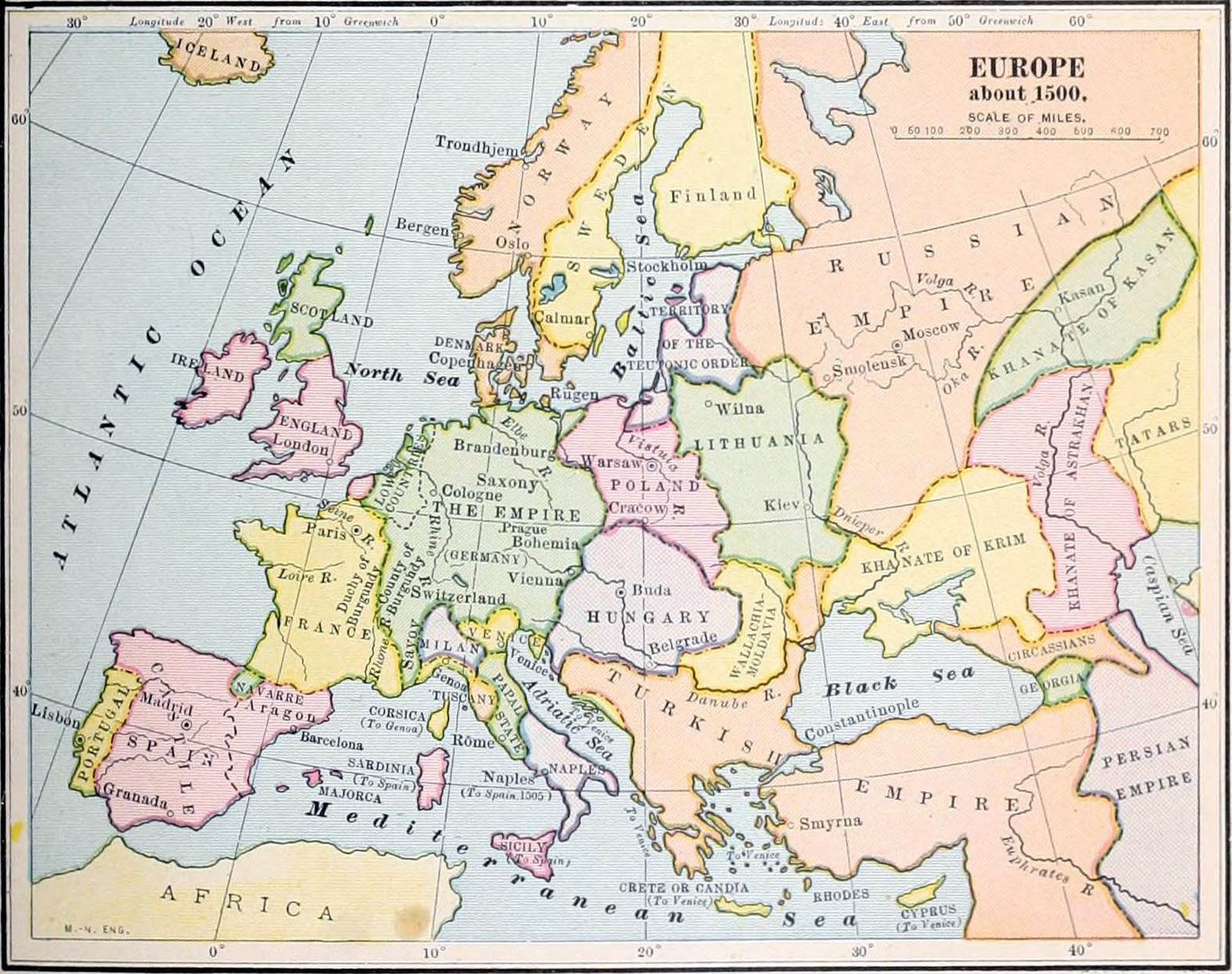
Nationalism is not easy to define. Nations are ideas, “imagined communities” with boundaries in the words of Benedict Anderson (1983). Anderson argued that the rise of modern nationalism relied on the creation of these “imagined communities” by “print capitalism”—where newspapers in a common language reproduce a sense of a shared past, present, and future among a group of people within a given boundary. Due to its reliance on the printing press, Anderson locates the origins of print capitalism in early modern Europe, although his study was based primarily on the rise of nationalism in modern Indonesia. Other features of the emergent national identity might include religion, ethnicity, or traditions. Yet no nation is homogenous. Even countries that are typically thought of as relatively homogenous, such as Norway and Japan, are quite diverse upon a closer look. Typically, a nation contains numerous ethnic, religious, and perhaps other kinds of divisions, which could claim to be nations in their own right. Nonetheless, various types of boundaries and borders, according to Anderson, became part of the process of defining who was “inside” and who was “outside” the imagined community. The same is true of colonies and former colonies, only more so. Some colonies contained a hundred or more different ethnic, religious, and political groups with histories of long and bitter conflict and weak to nonexistent economic links. Colonies like British India and French West Africa are particularly clear examples of this phenomenon. In South America, Colombia is one of the most ethnically diverse colonial creations. Often, different ethnic groups had nothing in common except their incorporation into highly artificial colonial units made up by Europeans. Later, this will have a dramatic effect on the creation of postcolonial states in Africa, Asia, the Caribbean, and Latin America.
The Protestant Reformation and the Origins of Print Capitalism
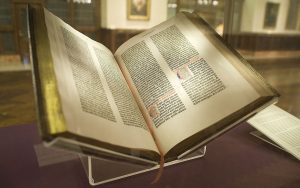
The arrival of the printing press in Europe in the middle of the fifteenth century allowed critics of the church like the friar Martin Luther to publish books and pamphlets calling for reform. Printing was a Chinese invention that was improved by Johannes Gutenberg, a German goldsmith who understood the value of moveable type. Printing spread classical Greek and Roman texts that had been carried to Europe by refugees from Constantinople, helping ignite the Renaissance (literally “rebirth”) of Europe. A new philosophy called Humanism focused scholars on learning that was not contained in scripture or in church-approved sources and on skepticism toward the decrees of religious authorities. Some Renaissance geniuses like Leonardo da Vinci and Michelangelo did not directly challenge the claims of political and religious authorities. Others like Machiavelli and Galileo did. The encounter with the Americas (the topic of the next chapter) also upset a traditional understanding of the world’s origin and history that did not account for the existence of these continents. And religious reformers like Martin Luther used the ability to print books to radically change the way Europeans thought about their Christianity and the Catholic Church.
Questions for Discussion
- Do you think the existence of the church in Europe was a significant factor in preventing an empire from forming?
- How did the spread of new knowledge encourage humanism and skepticism?
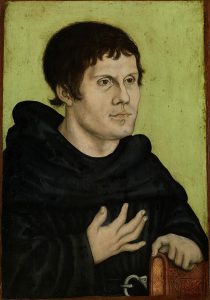
Martin Luther (1483–1546) was an Augustinian monk who began the Protestant Reformation as a reaction against what he perceived as a betrayal of Christian ideals by the wealthy and self-indulgent Catholic Church. The church had long gone through cycles of corruption and reform, which were usually led by new religious orders of monks (such as the Franciscans and Dominicans in the early 13th century). Among Luther’s radical ideas was that the Catholic Church and the papacy were so corrupt and far away from the teachings of Jesus that Christianity needed to be reestablished rather than reformed.
Luther received a doctorate in theology in 1512 and joined the faculty of the University of Wittenberg in Germany. In 1516, the Catholic Church began selling indulgences to raise money for the construction of St. Peter’s Basilica in Rome. Indulgences were basically tickets for “time off” in purgatory (the place souls went to purify before entering heaven), and Luther objected on theological grounds; he also criticized the wealthy pope for taxing the poor to build an unnecessary Vatican monument he could easily afford himself. Luther did not intend to split from the Catholic Church, but after his 95 Theses were translated from Latin to German, his criticism of the church and his new approach to theology caught on.
Luther was tried for heresy (no laughing matter: Czech religious reformer Jan Hus had been burned at the stake in 1415) and was excommunicated in 1521. The church banned Luther’s books, but Luther was a prolific writer who went on to publish scores of works using the new printing press condemning the Roman church. Luther translated the Bible into German and wrote a hymnal so Germans could worship in their own language and understand what they were saying at church—Latin was still the official language of the Catholic Church (and would remain so until 1965). Printing presses and expanding European literacy helped accelerate the Reformation.
Many members of the nobility, particularly in northern Germany and Scandinavia, embraced Luther’s ideas not only for theological reasons but also for political reasons: they would no longer need to pay tribute and pledge to submit their authority to the pope in Rome. The Reformation was not the only challenge that alarmed religious authorities into reacting with persecution. When Galileo used a telescope to prove Copernicus’s new theories that extended the understanding of planetary motion beyond the second-century theories of Ptolemy, the Catholic Church put him under house arrest. Galileo’s challenge to the church’s outdated description of the natural world was the first of many disputes that science has had (and continues to have) with religious authority.
To be fair, though, the idea that new data should challenge centuries of intellectual and theological tradition was as radical as the idea that the Earth orbits around the Sun and not vice versa. The church, and European society in general, sought to have eternal and unchanging answers for social and personal conditions. Although today we are accustomed to the idea that new information that can reorganize the ways we understand the world is always becoming available, this was not part of the early modern worldview—which makes Galileo and Luther such radical figures in European and Western history.
As challenges became more frequent, some people tried to resist them by force. The Inquisition and persecution of witches flourished because authorities felt threatened. And the doctrine of papal infallibility did not even exist until the First Vatican Council in 1868, when science had gained a pretty substantial lead over faith…something to think about, since it implies that the Catholic Church never seemed to need to declare infallibility until it was challenged.
Questions for Discussion
- Was Luther justified in criticizing church leaders in the Vatican?
- What other motivations did people have for rejecting Roman authority, beyond theological differences?
- Was the church’s reaction to the challenges of new doctrines and new information about the world appropriate?
The Scientific Revolution and the Enlightenment
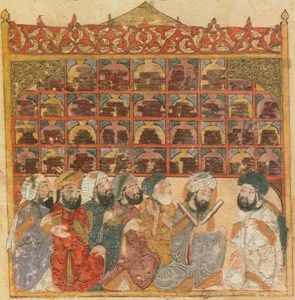
The development of science in Europe during the Renaissance would not have been possible without the contributions made by Muslim scholars. During the period when Europe was suffering an intellectual “Dark Age” in the centuries following the fall of Rome, the embrace of Islam in North Africa, the Middle East, and beyond created stability that encouraged the establishment of trade routes to China, which was accompanied by an exchange of ideas and technology. While medieval Christian monks in Europe were busy copying illuminated Latin Bibles and hymnals, scholars like Al-Khwarizmi (d. 850), the inventor of algebra; Al-Kindi (d. 873), philosopher and musician; Al-Zahrawi (d. 1013), the father of surgery; Ibn Al-Haytham (d. 1040), physicist and father of optics; Al-Biruni (d. 1050), historian and scientist; Ibn Sina (d. 1037), astronomer and physician; and Ibn Rushd (d. 1198), philosopher and scientist, not only preserved classical Greek philosophy and science that was lost to Christian communities in Europe but made important original contributions to knowledge and culture. In the 1200s, western Europeans began to change from Roman numerals (which did not use a zero) to arabic numerals. The introduction by Arab scholars in Iberia of many of these new ideas in astronomy, navigation, and mathematics soon spread to other parts of Europe. In 1492, Christopher Columbus was able to sail to the New World largely because of Arab naval and navigation technology.
There were many European philosophers and scientists who advanced the Enlightenment and changed the way Europeans thought about the world. Isaac Newton (1643–1727) coinvented calculus and produced the first unified theory of nature. Newton’s Principia Mathematica (1687) outlined the laws of motion and universal gravitation. His theories were basically undisputed until Einstein and quantum physics took up the challenge of describing the universe at the macroscopic and microscopic levels in the early 20th century. Other important Enlightenment thinkers included Émilie du Châtelet, a French aristocrat who studied and translated both Newton and his chief rival, German mathematician Gottfried Wilhelm Leibniz.
Leibniz was the other inventor of calculus, and the version we now use is actually based a little bit more on his notation system than on Newton’s. These scholars and their colleagues described their field as “natural science,” and they tried to find natural laws for society, politics, and the economy to parallel Newton’s discoveries of gravity and optics. John Locke, Adam Smith, and Voltaire formulated ideas about natural rights and society that epitomized what English speakers called Enlightenment and what Germans like philosopher Immanuel Kant called Aufklärung (literally, a “clearing up”). Kant famously explained that his Aufklärung was humanity’s emergence from its self-imposed adolescence.
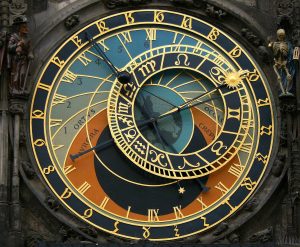
One of the consequences of Newton’s physics and other Enlightenment ideas was a crisis in religion. Although Newton himself seems to have believed in a God of some type, the universe he described in his theories did not require a personal deity to be actively engaged in making things happen. Newton’s universe seemed more like one of the new mechanical clocks that were just becoming popular. These complex machines might require a mechanical engineer or a watchmaker to design and build them, but once made and wound, they could be left to themselves. Absorbing this watchmaker metaphor, many Enlightenment thinkers rejected the popular religious vision of an activist God who was involved in the day-to-day operation of the world, who rewarded the righteous and punished sinners, or who chose sides in history. The Protestant idea of predestination suggested that there was no free will and that, from God’s perspective, time and chance did not really exist. Many also began to doubt traditional stories of the deity’s interference in history, including the Christian story of Jesus.
For example, Scottish philosopher David Hume wrote an essay on miracles in 1748 that was widely influential and is still a required text for philosophy students. Hume argued not that miracles could not happen but that people who believed in miracles were usually not talking about events they had witnessed themselves—only retelling stories of miracles they had heard or read about (for instance, in the Christian Bible). For Hume, the issue that divided religious believers from skeptics was not actually miracles but testimony about miracles reported to have happened years, decades, or even centuries ago.
In contrast, Hume argued, laws of nature could be deduced right now because they continued to operate, and their effects could be seen every day. Hume left this essay out of the first edition of his book An Enquiry into Human Understanding to avoid antagonizing the faithful. But it found its way into print and remains an important challenge to traditions that seek to assert their authority based on supernatural claims.
Questions for Discussion
- How did Muslim scholars contribute to building the modern world?
- Do you think the term Enlightenment (or Aufklärung) is an accurate description of the change in our understanding of the world produced by the new “natural science”?
- Were philosophers such as David Hume justified in suggesting that supernatural claims were problematic?
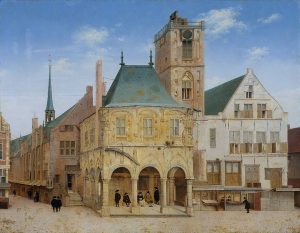
European intellectuals also considered economic questions. For example, Adam Smith discussed a concept he called “mercantilism,” which he explained as a system based on the total wealth of a nation as measured by its sum total possessions of gold and silver. Therefore, Smith argued, mercantilism incentivized countries to maximize their exports as much as possible. Ever a critic of mercantilism, Smith argued that the true value of a country was its output of labor. Thus, the economists influenced by Adam Smith began to look more closely at the conditions of laborers and population growth rates. Later economists would begin to identify mercantilism with capitalism.
An agricultural revolution contributed to increased crop production and population growth in the 1400s, which led to a surplus population being able to gather in towns and cities to engage in artisanal activities—metropolises that were once mainly centers of commerce and government and church administration began to produce goods for trade as well. Even before the development of mechanized textile factories in Great Britain, for example, weavers lived and worked in districts like East London for generations. People began to specialize in particular trades, making products for customers beyond their own families and neighborhoods. Some general-purpose craftsmen like blacksmiths became increasingly specialized, focusing on manufacturing products with broader, mass markets (for example, guns or carriage springs rather than just horseshoes, nails, hinges, and whatever the locals needed from day to day).
Did you know?
Adam Smith has often been misinterpreted as a supporter of “capitalism.” But Smith actually did not argue in favor of capitalism. The most similar term he used was mercantilism. Capitalism was defined by later economists, especially in the 19th century. The term refers to an economic system controlled by “capitalists.” These economists defined capitalists as a class of people who did no labor but made most of their wealth by simply already having wealth and investing it.
Politics and finance were connected at this time: European mercantilism and, later, European capitalism did not develop in a vacuum. International merchants, supply chains, and sources of labor were fundamentally critical in the shift of 18th-century mercantilist-imperialist economies toward capitalist-imperialist economies. The emergence of these modern economic systems relied on, for example, Latin American silver, American cotton, Indian dyes, Southeast Asian spices, Chinese tea, Caribbean sugar, and Welsh coal. The notion that somehow capitalism emerged in a vacuum in Europe, without relying upon colonialism, imperialism, and the abuse of labor across the world—and within Europe itself—is ahistorical, as we shall see over the course of the coming chapters.
Questions for Discussion
- Is it significant that the stories we tell about the capitalist system focus on the “invisible hand” and stress freedom in spite of the close ties between business and government power?
The Reconquista and Portuguese Trade with Africa
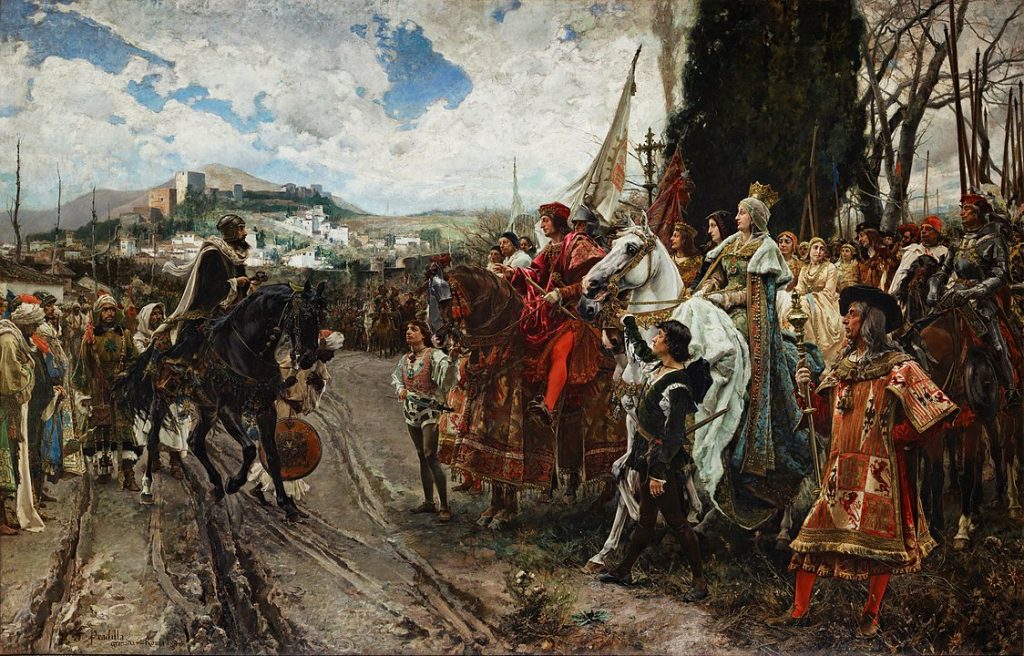
In the next chapter, we will turn to the Americas and their discovery by Europeans. The backstory for this discovery and colonization is the Reconquista, a centuries-long effort by the Portuguese and Spanish to push the Muslim Moors back to Africa. Muslims had taken over most of the Iberian Peninsula beginning in 711. The Reconquista begun by Christian nobles in northern Spain took about 800 years to complete.
The Portuguese Christians “reconquered” more quickly, because Portugal does not extend as far into the south, and the Spanish kings and princes had to contend with the fortified cities of Seville and Granada. However, Portugal also captured Ceuta, a Moroccan fortress in North Africa, in 1415, which gave them control over the western Mediterranean and the Atlantic. After a brief but successful war with Castile, the principal kingdom in central Spain, Portugal turned its attention to exploring and acquiring territory along the coast of Africa in the 1430s and 1440s under the direction of Prince Henry the Navigator (Henry’s older brother Edward became king when their father died of the plague). The Portuguese were becoming merchants and traders while the Christian Spanish were still fighting Muslims.
Portuguese mariners, following the route established by Bartolomeu Dias and Vasco da Gama in 1488 and 1497, began sailing to Asia by making their way down the western coast of Africa and then around southern Africa to the eastern coast. They established colonies in Angola and Mozambique and conquered several East African city-states such as Kilwa and Mombasa. They also took advantage of a slave-trading network off the east coast of Africa that provided possibly 10 million captives for Muslim slave auctions from the 9th century to the 20th. By 1505, they had spread their empire to Goa, along the coast of India, and by 1511, they had conquered the small (but critical) Sultanate of Melaka in Southeast Asia. By controlling Malacca, the Portuguese could control the taxation point between Indian and Pacific Ocean trade networks.
Portuguese control of the African coast was one of the reasons the royal court in Lisbon showed little interest in Columbus’s proposal to sail west across the Atlantic to “the Indies”; it is also why the Spanish were eager to take Columbus up on his plan in search of a route to Asia.
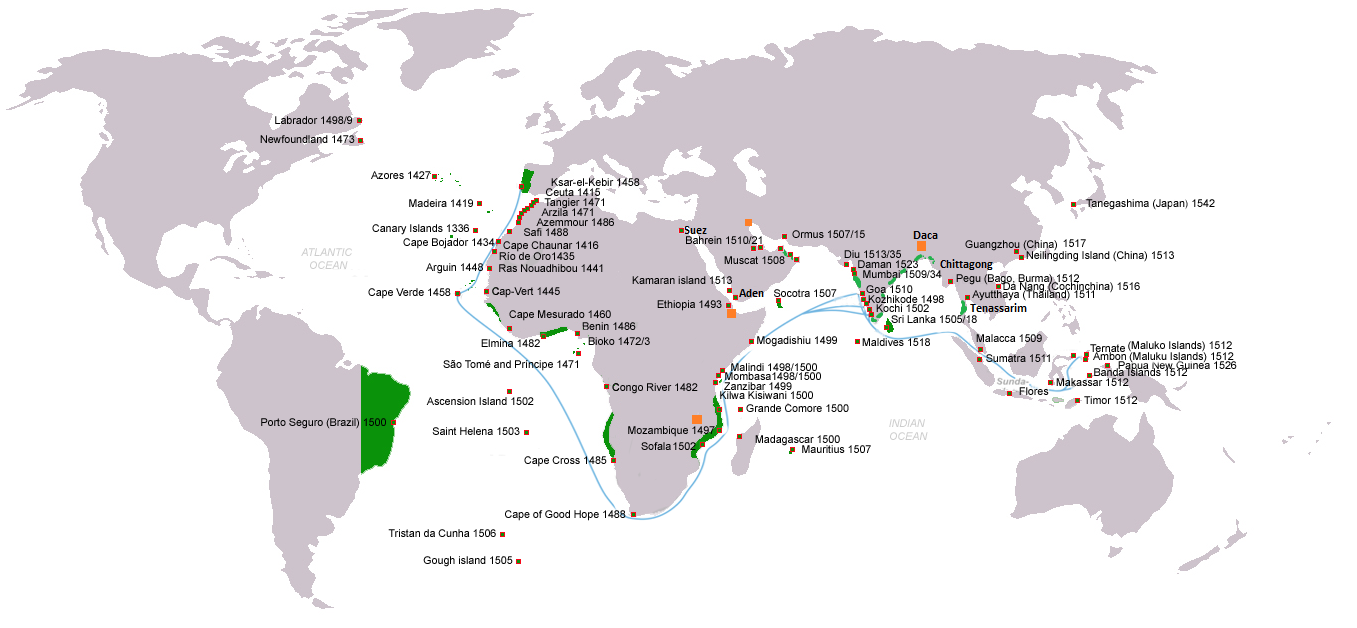
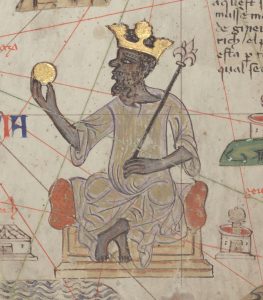
Portuguese merchants were interested in developing a route around Africa to Asia for the trade in spice and silks, but they were pleased to find trade in sub-Saharan Africa as well. The story of the enormous gold reserves of Mansa Musa, Muslim ruler of Mali, was well known to Europeans. After all, Mansa Musa had donated so much gold in Cairo during his hajj (pilgrimage) to Mecca in 1327 that local markets were flooded with currency, and there was an economic crisis. The Portuguese inquired about the availability of gold in every contact that they made in their explorations and were not disappointed. Present-day Ghana in West Africa was known as the “gold coast” by European traders and imperialists until its independence in 1957 and is still second only to South Africa in gold production on the continent.
As in most world societies in the 1400s, the institution of slavery was a traditional element in African empires, kingdoms, and chiefdoms. Captives were usually acquired through war or as for payment of debts and enslaved for a period of time or even for their entire lives. However, enslaved captives often gained positions in the societies that had captured them, and their children were generally born free. African traders were willing to include this human cargo in commerce with the Portuguese and other Europeans, who readily accepted them as enslaved laborers and domestic servants.
The trade of enslaved people, especially from eastern Europe, had been important in many parts of that continent even into the 1400s. As we have seen, in the Ottoman Empire, the Janissaries were eastern European captives who were trained as an elite military corp. The thriving economies of all the Islamic empires, from Spain to Persia, also created a demand for enslaved people, many of whom worked on farms. The Vikings of northern Europe sold captives from Britain to the Middle East, as did the Frankish kings of western and central Europe, who enslaved prisoners-of-war from among the Slavic peoples of eastern Europe (as had the Romans before them). Although the demand for enslaved labor was less in Europe than in the more economically developed Muslim world, some European slaves certainly served owners in the fiefdoms of western Europe.
The human cargo brought to Europe from Africa by the Portuguese in the 1400s, however, became much more highly favored than that of eastern Europe: not only were dark-skinned people more exotic for service in the royal courts, but they also could not escape by simply blending in with the local population. One can easily imagine how this would lead to ideas of superior and inferior races—within a few generations, slave-owning “whites” would consider “blacks” to be only suited for enslavement.
However, what made the African slave trade so lucrative by the 1500s and into the beginning of the 1800s was the demand for labor not in Europe but rather on sugar plantations on the islands of the Atlantic and later in Brazil and the Caribbean. The vast majority of the enslaved from Africa were used as forced labor in the back-breaking cultivation and processing of sugarcane. Portuguese trade with sub-Saharan Africa coincided with the discovery that sugarcane grew well on the eastern Atlantic islands off the African coast controlled by the Portuguese and Spanish in the 1400s.
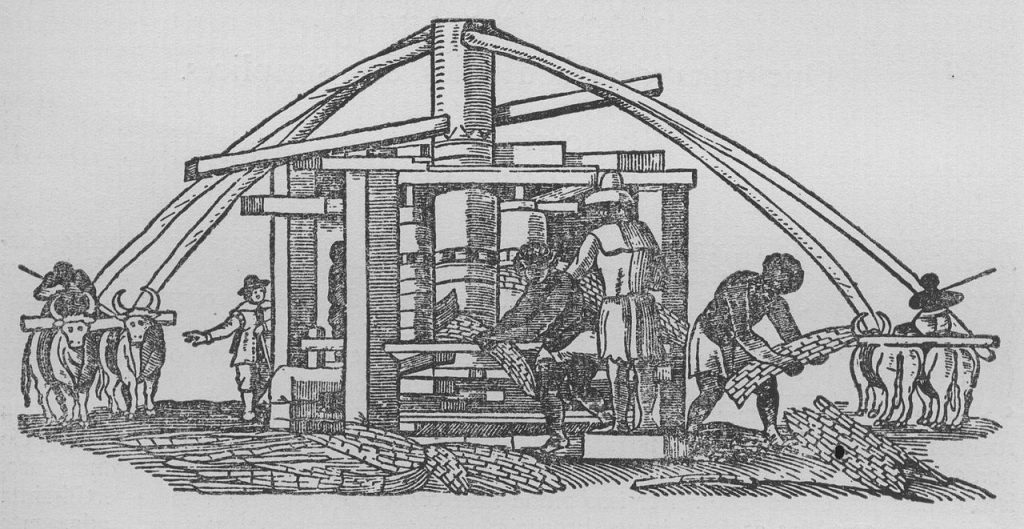
Sugarcane itself was first developed in the archipelagos of Southeast Asia. Arab traders brought the plant to the Middle East, where Europeans discovered sugar during the Crusades and developed a taste for it through their commerce in the region. Sugar was at first considered an exotic medicinal, but once the Portuguese and Spanish began cultivating cane on the Madeiras and Canary Islands, a European addiction to sugar soon began—replacing honey as the region’s main sweetener.
Eventually, more than two-thirds of all enslaved Africans in the Western Hemisphere were involved in cultivating, harvesting, and processing sugarcane in Brazil and the Caribbean. Sugar was such a lucrative cash crop for plantation owners that they would import enslaved Africans, work them to death in three to five years, and bring in more. We will examine this history in a later chapter.
The Portuguese established their presence along the west coast of Africa by the 1500s. Their arrival ignited a dispute in the kingdom of the Kongo between those who supported greater contacts and those who were opposed. The faction of the Kongolese royal family that supported greater contacts ultimately won, and in 1506, the Portuguese helped King Alfonso, who had converted to Christianity, seize the throne. Afonso I then tried to negotiate as a peer with the rulers of Portugal. To his chagrin, King Afonso had not been able to prevent Portuguese slave traders from indiscriminately taking people with high social status in his kingdom as slaves. Generally, only criminals and war captives were sold to foreign slavers, not the sons of noblemen and the king’s relatives. It is unclear whether King Afonso tried to ban all trade in slaves or whether he compromised to avoid antagonizing his European allies. Either way, his ban was ineffective, and the Portuguese carried off more and more slaves to their sugar plantations in Brazil. By 1575, the Portuguese declared the first European colony in sub-Saharan Africa, which they called Angola and was located just to the south of the kingdom of Kongo.
The Iberians frequently tried to claim that they were doing the Africans a favor by Christianizing them. But conditions on sugar plantations were so harsh that slaves typically only survived a few years. So their conversions were not so much to prepare them for a life as Christians but to save their souls when they perished from overwork and malnutrition. Over the next several centuries, nearly six times more Africans were forcibly sent to the Americas than Europeans who went willingly. In all, about 16 million Africans were shipped to the Americas in chains. About 4 million died on the way and were thrown overboard into the Atlantic.
Questions for Discussion
- How was the slave trade practiced by the Portuguese different than earlier types of unfree labor?
- How significant was the European interest in sugar to the growth of slavery in the Atlantic world?
Primary Source Supplement #1: King Afonso I of the Kongo’s letters to João, King of Portugal
Sir, Your Highness should know how our kingdom is being lost in so many ways that it is convenient to provide for the necessary remedy, since this is caused by the excessive freedom given by your agents and officials to the men and merchants who are allowed to come to this kingdom to set up shops with goods and many things which have been prohibited by us, and which they spread throughout our kingdoms and domains in such an abundance that many of our vassals, whom we had in obedience, do not comply because they have the things in greater abundance than we ourselves; and it was with these things that we had them content and subjected under our vassalage and jurisdiction, so it is doing a great harm not only to the service of God, but the security and peace of our kingdoms and state as well.
And we cannot reckon how great the damage is, since the mentioned merchants are taking every day our natives, sons of the land and the sons of our noblemen and vassals and our relatives, because the thieves and men of bad conscience grab them wishing to have the things and wares of this kingdom which they are ambitious of; they grab them and get them to be sold; and so great, Sir, is the corruption and licentiousness that our country is being completely depopulated, and Your Highness should not agree with this nor accept it as in your service. And to avoid it we need from those your kingdoms no more than some priests and a few people to reach in schools, and no other goods except wine and flour for the holy sacrament. That is why we beg of Your Highness to help and assist us in this matter, commanding your factors that they should not send here either merchants or wares, because it is our will that in these kingdoms there should not be any trade of slaves nor outlet for them. Concerning what is referred above, again we beg of Your Highness to agree with it, since otherwise we cannot remedy such an obvious damage. Pray Our Lord in His mercy to have Your Highness under His guard and let you do forever the things of His service. I kiss your hands many times.
(dated July 6, 1526)
Moreover, Sir, in our kingdoms there is another great inconvenience which is of little service to God, and this is that many of our people, keenly desirous as they are of the wares and things of your kingdoms, which are brought here by your people, and in order to satisfy their voracious appetite, seize many of our people, freed and exempt men, and very often it happens that they kidnap even noblemen and the sons of noblemen, and our relatives, and take them to be sold to the white men who are in our kingdoms; and for this purpose they have concealed them; and others are brought during the night so that they might not be recognized.
And as soon as they are taken by the white men they are immediately ironed and branded with fire, and when they are carried to be embarked, if they are caught by our guards’ men the whites allege that they have bought them but they cannot say from whom, so that it is our duty to do justice and to restore to the freemen their freedom, but it cannot be done if your subjects feel offended, as they claim to be.
And to avoid such a great evil we passed a law so that any white man living in our kingdoms and wanting to purchase goods in any way should first inform three of our noblemen and officials of our court whom we rely upon in this matter…who should investigate if the mentioned goods are captives or free men, and if cleared by them there will be no further doubt nor embargo for them to be taken and embarked. But if the white men do not comply with it they will lose the aforementioned goods. And if we do them this favor and concession it is for the part Your Highness has in it, since we know that it is in your service too that these goods are taken from our kingdom, otherwise we should not consent to this. . . .
Sir, Your Highness has been kind enough to write to us saying that we should ask in our letters for anything we need, and that we shall be provided with everything, and as the peace and the health of your kingdom depend on us, and as there are among us old folks and people who have lived for many days, it happens we have continuously many and different diseases which put us very often in such a weakness that we reach almost the last extreme; and the same happens to Our children, relatives and natives owing to the lack in this country of physicians and surgeons who might know how to cure properly such diseases. And us we have got neither dispensaries nor drugs which might help us in this forlornness, many of those who had been already confirmed and instructed in the holy faith of Our Lord Jesus Christ perish and die; and the rest of the people in their majority cure themselves with herbs and breads and other ancient methods, so that they put all their faith in the mentioned herbs and ceremonies if they live, and believe that they are saved if they die; and this is not much in the service of God. And to avoid such a great error and inconvenience, since it is from God in the first place and then from your kingdoms and from Your Highness that all the good and drugs and medicines have come to save us, we beg of you to be agreeable and kind enough to send us two physicians and two apothecaries and one surgeon, so that they may come with all the necessary things to stay in our kingdoms, because we are in extreme need of them. We shall do them all good and shall benefit them by all means, since they are sent by Your Highness, whom we thank for your work in their coming. We beg of Your Highness as a great favor to do this for us, because besides being good in itself it is in the service of God as we have said above.
(dated October 18, 1526)
Primary Source Supplement #2: Excerpts from Luther’s Address to the Christian Nobility of the German Nation, 1520.
The Romanists have, with great adroitness, drawn three walls round themselves, with which they have hitherto protected themselves, so that no one could reform them, whereby all Christendom has suffered terribly.
First, if pressed by the temporal power, they have affirmed and maintained that the temporal power has no jurisdiction over them, but, on the contrary, that the spiritual power is above the temporal.
Secondly, if it were proposed to admonish them with the Scriptures, they objected that no one may interpret the Scriptures but the Pope.
Thirdly, if they are threatened with a council, they invented the notion that no one may call a council but the Pope.
Thus they have privily stolen from us our three sticks, so that they may not be beaten. And they have dug themselves in securely behind their three walls, so that they can carry on all the knavish tricks which we now observe…
Now may God help us, and give us one of those trumpets that overthrew the walls of Jericho, so that we may blow down these walls of straw and paper, and that we may have a chance to use Christian rods for the chastisement of sin, and expose the craft and deceit of the devil; thus we may amend ourselves by punishment and again obtain God’s favor.
Let us, in the first place, attack the first wall.
There has been a fiction by which the Pope, bishops, priests, and monks are called the ‘spiritual estate’; princes, lords, artisans, and peasants are the ‘temporal estate.’ This is an artful lie and hypocritical invention, but let no one be made afraid by it, and that for this reason: that all Christians are truly of the spiritual estate, and there is no difference among them, save of office. As St Paul says (I Cor. xii), we are all one body, though each member does its own work so as to serve the others. This is because we have one baptism, one Gospel, one faith, and are all Christians alike; for baptism, Gospel, and faith, these alone make spiritual and Christian people.
As for the unction by a pope or a bishop, tonsure, ordination, consecration, and clothes differing from those of laymen—all this may make a hypocrite or an anointed puppet, but never a Christian or a spiritual man. Thus we are all consecrated as priests by baptism, as St Peter says: ‘Ye are a royal priesthood, a holy nation’ (I Pet. ii. 9); and in the Book of Revelation: ‘and hast made us unto our God (by Thy blood) kings and priests’ (Rev. v. 10). For, if we had not a higher consecration in us than pope or bishop can give, no priest could ever be made by the consecration of pope or bishop, nor could he say the mass or preach or absolve. Therefore the bishop’s consecration is just as if in the name of the whole congregation he took one person out of the community, each member of which has equal power, and commanded him to exercise this power for the rest; just as if ten brothers, co-heirs as king’s sons, were to choose one from among them to rule over their inheritance, they would all of them still remain kings and have equal power, although one is appointed to govern.
And to put the matter more plainly, if a little company of pious Christian laymen were taken prisoners and carried away to a desert, and had not among them a priest consecrated by a bishop, and were there to agree to elect one of them … and were to order him to baptize, to celebrate the mass, to absolve and to preach, this man would as truly be a priest, as if all the bishops and all the popes had consecrated him. That is why, in cases of necessity, every man can baptize and absolve, which would not be possible if we were not all priests. This great grace and virtue of baptism and of the Christian estate they have annulled and made us forget by their ecclesiastical law . . .
Since then the ‘temporal power’ is as much baptized as we, and has the same faith and Gospel, we must allow it to be a priest and bishop, and account its office an office that is proper and useful to the Christian community. For whatever has undergone baptism may boast that it has been consecrated priest, bishop, and pope, although it does not beseem every one to exercise these offices. For, since we are all priests alike, no man may put himself forward, or take upon himself without our consent and election, to do that which we have all alike power to do. For if a thing is common to all, no man may take it to himself without the wish and command of the community. And if it should happen that a man were appointed to one of these offices and deposed for abuses, he would be just what he was before. Therefore a priest should be nothing in Christendom but a functionary; as long as he holds his office, he has precedence; if he is deprived of it, he is a peasant or a citizen like the rest. Therefore a priest is verily no longer a priest after deposition. But now they have invented characteres indelibiles, and pretend that a priest after deprivation still differs from a mere layman. They even imagine that a priest can never be anything but a priest—that is, he can never become a layman. All this is nothing but mere talk and a figment of human invention.
It follows, then, that between laymen and priests, princes and bishops, or, as they call it, between ‘spiritual’ and ‘temporal’ persons, the only real difference is one of office and function, and not of estate . . .
But what kind of Christian doctrine is this, that the ‘temporal power’ is not above the ‘spiritual,’ and therefore cannot punish it! As if the hand should not help the eye, however much the eye be suffering . . . Nay, the nobler the member the more bound the others are to help it . . .
Therefore I say, forasmuch as the temporal power has been ordained by God for the punishment of the bad and the protection of the good, we must let it do its duty throughout the whole Christian body, without respect of persons, whether it strike popes, bishops, priests, monks, nuns, or whoever it may be . . .
Whatever the ecclesiastical law has said in opposition to this is merely the invention of Romanist arrogance . . .
Now, I imagine the first paper wall is overthrown, inasmuch as the ‘temporal’ power has become a member of the Christian body; although its work relates to the body, yet does it belong to the ‘spiritual estate’ . . .
It must indeed have been the archfiend himself who said, as we read in the canon law, ‘Were the pope so perniciously wicked as to be dragging hosts of souls to the devil, yet he could not be deposed. This is the accursed, devilish foundation on which they build at Rome, and think the whole world may go to the devil rather than that they should be opposed in their knavery. If a man were to escape punishment simply because he was above his fellows, then no Christian might punish another, since Christ has commanded that each of us esteem himself the lowest and humblest of all (Matt. xviii. 4; Luke ix. 48).
The second wall is even more tottering and weak: namely their claim to be considered masters of the Scriptures . . . If the article of our faith is right, ‘I believe in the holy Christian Church,’ the Pope cannot alone be right; else we must say, ‘I believe in the Pope of Rome,’ and reduce the Christian Church to one man, which is a devilish and damnable heresy. Besides that, we are all priests, as I have said, and have all one faith, one Gospel, one Sacrament; how then should we not have the power of discerning and judging what is right or wrong in matters of faith? . . .
The third wall falls of itself, as soon as the first two have fallen; for if the Pope acts contrary to the Scriptures, we are bound to stand by the Scriptures to punish and to constrain him, according to Christ’s commandment . . . ‘tell it unto the Church’ (Matt. xviii, 15–17) . . . If then I am to accuse him before the Church, I must collect the Church together . . . Therefore when need requires, and the Pope is a cause of offense to Christendom, in these cases whoever can best do so, as a faithful member of the whole body, must do what he can to procure a true free council. This no one can do so well as the temporal authorities, especially since they are fellow-Christians, fellow-priests . . .
. . . Poor Germans that we are—we have been deceived! We were born to be masters, and we have been compelled to bow the head beneath the yoke of our tyrants, and to become slaves. Name, title, outward signs of royalty, we possess all these; force, power, right, liberty, all these have gone over to the popes, who have robbed us of them. They get the kernel, we get the husk . . . It is time the glorious Teutonic people should cease to be the puppet of the Roman pontiff. Because the pope crowns the emperor, it does not follow that the pope is superior to the emperor. Samuel, who crowned Saul and David, was not above these kings, nor Nathan above Solomon, whom he consecrated . . . Let the emperor then be a veritable emperor and no longer allow himself to be stripped of his sword or of his scepter!
Media Attributions
- NIE_1905_Europe_-_About_1500 © Dodd, Mead & Company is licensed under a Public Domain license
- Gutenberg_Bible,_Lenox_Copy,_New_York_Public_Library,_2009._Pic_01 © NYC Wanderer (Kevin Eng) is licensed under a CC BY-SA (Attribution ShareAlike) license
- Portrait_of_Martin_Luther_as_an_Augustinian_Monk © Cranach Digital Archive is licensed under a Public Domain license
- Maqamat_hariri © Zereshk is licensed under a Public Domain license
- Astronomical_Clock,_Prague © Jay8085—originally posted to Flickr as Astronomical Clock, Prague, CC BY 2.0
- Saenredam—Het oude stadhuis te Amsterdam © Pieter Jansz. Saenredam is licensed under a Public Domain license
- La Rendición de Granada—Pradilla © Francisco Pradilla Ortiz is licensed under a Public Domain license
- Portuguese_discoveries_and_explorationsV3en © Hugo Refachinho is licensed under a CC BY-SA (Attribution ShareAlike) license
- Catalan Atlas BNF Sheet 6 Mansa Musa (cropped) © Abraham Cresques is licensed under a Public Domain license
- Guilherme_Piso_engenho_1648 © Guilherme Piso is licensed under a Public Domain license

